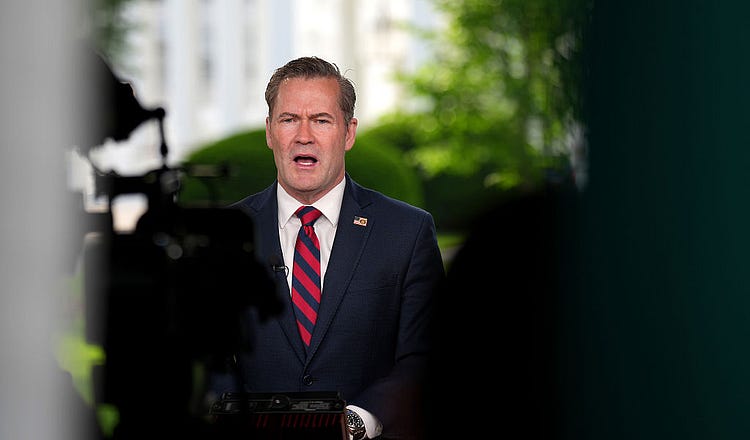
The Free Press

There are some jobs in life that are almost impossible to keep: manager of the New York Yankees under George Steinbrenner, al-Qaeda’s number three, and of course, Donald Trump’s national security adviser. Mike Waltz on Thursday lost that post after less than four months on the job.
It follows a pattern. The 47th president burned through four national security advisers his first time around. Mike Flynn lasted a total of 22 days before he was forced to resign over a spurious FBI investigation. He was replaced by H.R. McMaster, who lasted barely 13 months. McMaster was replaced by John Bolton, who made it 17 months. And Bolton was replaced by Robert O’Brien, who remained for 16.
As far as Trump firings go, Waltz was ushered out the door gently. The president will nominate him to be the next U.S. ambassador to the United Nations. On Truth Social, Trump wrote: “From his time in uniform on the battlefield, in Congress and, as my National Security Advisor, Mike Waltz has worked hard to put our Nation’s Interests first. I know he will do the same in his new role.”
For the time being, Marco Rubio will be the first official since Henry Kissinger to hold posts as secretary of state and national security adviser simultaneously.
Like nearly all of Trump’s national security advisers have been, Waltz was on borrowed time. It didn’t help that the former Republican member of Congress accidentally included the editor of The Atlantic, Jeffrey Goldberg, in a Signal group chat discussing plans to bomb Houthi targets in Yemen in March. But after that embarrassment, Trump stuck by his man.
So what changed in the five weeks between Signalgate and now?
According to three administration officials, the national security adviser had an icy relationship with Trump’s powerful chief of staff, Susie Wiles. Wiles pressed Waltz for more transparency on foreign policy matters like planning the guest list for a White House dinner with Indian prime minister Narendra Modi, according to one former administration official. Waltz tried to accommodate her, but never established trust with Trump’s main gatekeeper. Early on, for example, Waltz asked for more autonomy to hire his own senior staff at the National Security Council, which he was reluctantly given.
It wasn’t just a personality clash, however. While Waltz was a popular surrogate for the Trump campaign in 2024, he was never fully trusted by the MAGA grassroots. This became clear last month when Trump influencer Laura Loomer met with Trump personally and persuaded him to fire key senior directors on the NSC, going over Waltz’s head.
Waltz was also perceived by a faction of the MAGA base to be too hawkish on Iran. He often spoke about dismantling Iran’s entire nuclear program, a position that Iran’s envoys have said is not negotiable. That was Trump’s view in his first term. It’s why he withdrew from his predecessor’s Iran nuclear deal. But his lead negotiator in these talks, Steve Witkoff, said after the first round of U.S.-Iran talks that mullahs could continue to enrich uranium so long as it was suitable for nuclear power but not nuclear weapons. That position is in line with the the ascendant “restrainer” wing of the GOP, led by the president’s son, Donald Trump Jr., Vice President J.D. Vance, and broadcaster Tucker Carlson, all of whom have argued that avoiding a war with Iran is worth the risk of Iran going nuclear.
Waltz’s departure, in this sense, takes on an ideological dimension. Will Rubio remain both the secretary and the adviser? Or will Trump replace Waltz with a “restrainer”? Names floated inside the Trump administration include Witkoff, former ambassador to Germany Ric Grenell, and White House deputy chief of staff Stephen Miller. If the vicious fight over Waltz, when he was named last year, is any indication, expect a torrent of leaks in the coming days as the president weighs this decision.
Finally, Waltz had to contend with a vice president who played a key role in shaping national security policy. The problem, according to two former administration officials, was that Vance often operated outside the official process of the National Security Council, which is supposed to coordinate the input from the Pentagon, State Department, Treasury Department, Justice Department, and the intelligence community. This meant that the process was often chaotic. Vance took the lead, for example, on TikTok, the Chinese social media app, which has stalled a decision on whether America will actually force the Chinese company that owns TikTok to sell it off, according to these officials.
The question, though, is why any of this would matter. Trump doesn’t seem to mind policy chaos inside of his government—if anything, it’s a feature, not a bug. Just remember the roller coaster of DOGE in its early days, or the seemingly constant announcement and reversal of tariffs. Nor does Trump really seem to mind incompetence. Yes, Waltz’s staff accidentally included Goldberg on the Signal chat, but Secretary of Defense Pete Hegseth shared details of the strikes on this nongovernment channel and he remains in his post.
Whatever reason Waltz was dismissed, his departure is being perceived as a win for the faction of the party that would rather allow Iran to go nuclear than risk a war to stop them. The former congressman was not really an ideologue or a militarist, but he represented a more traditional GOP foreign policy that sought to preserve our alliances and deter our adversaries. If he is replaced by Witkoff or another restrainer, then America’s allies may find themselves looking for new friends in a far more dangerous world.
Read Eli Lake’s latest essay on how rogue nations end up with nuclear weapons:





